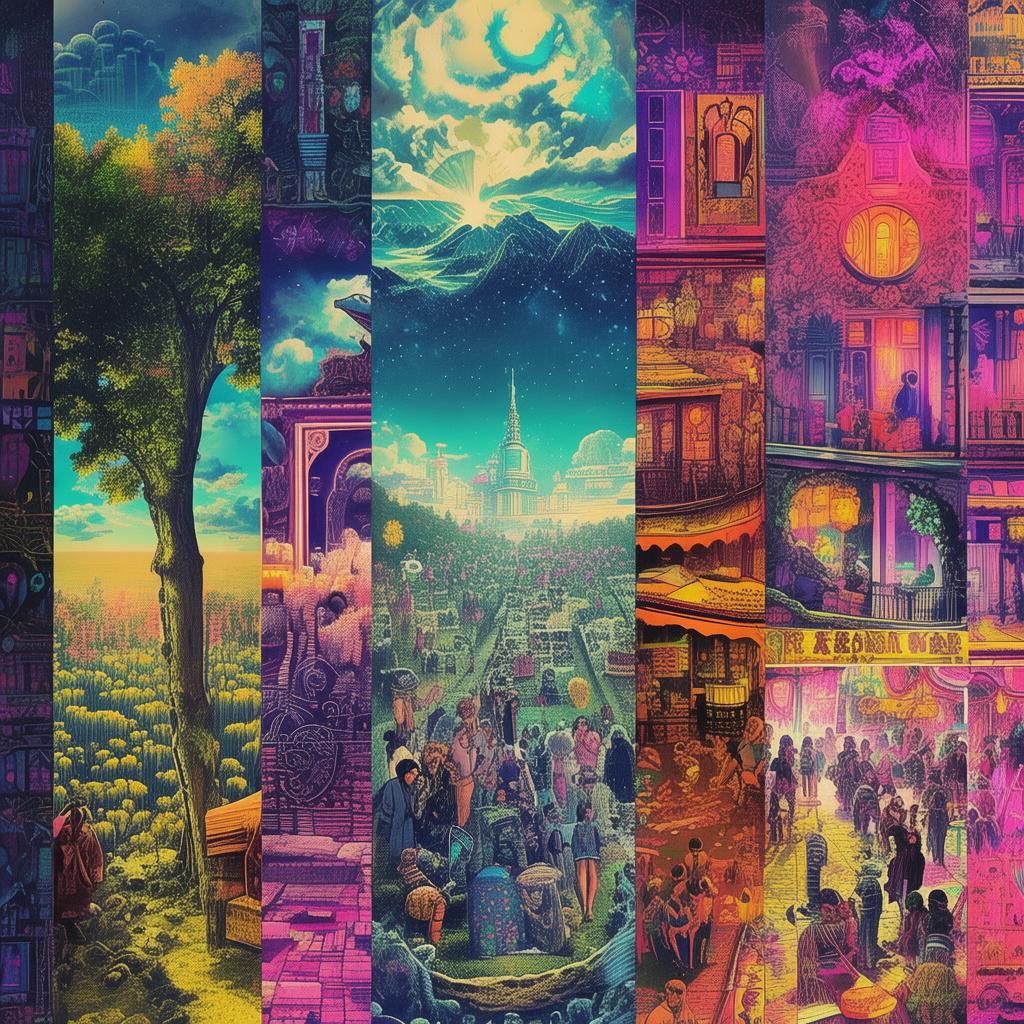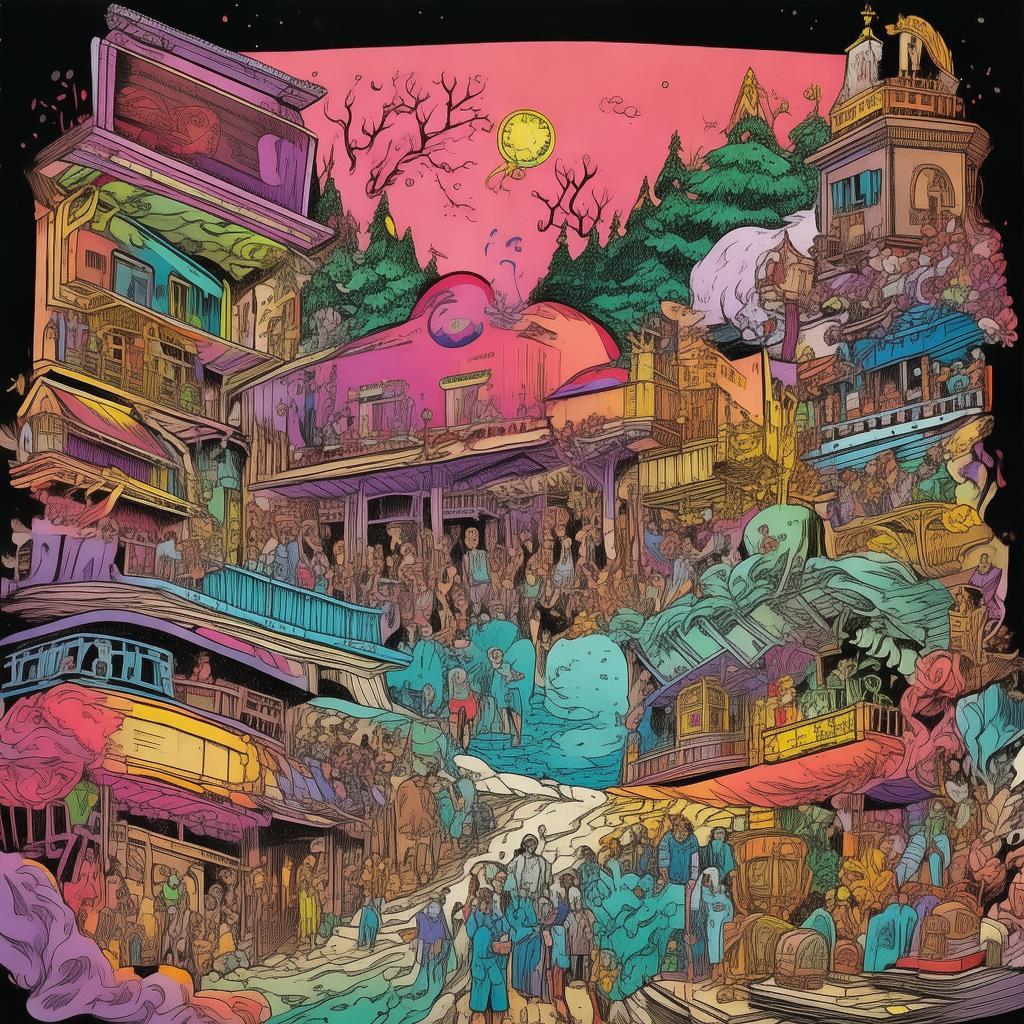The Quake's Whisper: A Sichuan Melody
The sky was a canvas of grey, the world hushed under the relentless pounding of the earth. In the remote village of Leshan, nestled against the towering cliffs that bore the weight of Buddha’s serene gaze, the ground trembled with a force that seemed to rip apart the very fabric of time.
It was a day like any other, the sun casting a warm glow over the terraced rice fields, until a low, ominous rumble shook the very core of the village. Houses crumbled, and dust swirled in the air like a living thing. People screamed, and children wailed, as the earth, once a steadfast guardian, now betrayed them.
Amidst the chaos, there was a melody. A haunting, ethereal tune that seemed to float above the noise, a siren call to those trapped beneath the ruins. It was the voice of the village, the heartbeat of a place that had withstood the test of time, now fighting for survival.
Liu Mei, a young woman with a voice that could move mountains, had always felt a connection to the melody. She was a musician, a keeper of the village’s traditions, and the melody was her song, her story. Now, as she scrambled over broken bricks and through the debris of her home, the melody was her guide, her lifeline.
“Liu Mei!” a voice called out, cutting through the cacophony. It was Liang, a man who had loved Liu Mei since they were children. His eyes were filled with concern, his hands clutching a makeshift first aid kit.
“Liang, are you okay?” Liu Mei asked, her voice tinged with fear.
“I’m fine, but I need your help,” Liang said, his voice urgent. “My mother is trapped under the fallen wall. We have to get to her.”
Liu Mei nodded, her heart heavy with the weight of the village’s pain. She and Liang worked together, their hands grimy with dirt and sweat, as they dug through the rubble. Hours passed, and as the sun began to set, hope began to wane.
Just as they were about to give up, the melody grew louder, clearer. It was then that they heard a faint cry for help. “Here!” Liang shouted, and they worked with renewed fervor, their hands now moving with purpose.
Finally, they reached the opening in the debris, and there, half-buried in the remains of her home, was Liang’s mother. She was alive, her eyes wide with terror, but she was weak.
“Mom!” Liang cried, as he helped her to safety.

The melody, once a whisper, now a roar, seemed to celebrate their triumph. But as they helped Liang’s mother to the relative safety of the open fields, they were met with a new horror. The river, once a gentle companion to the village, had surged, and the bridge that connected the village to the outside world was now a treacherous torrent of water.
“We have to find a way to cross,” Liu Mei said, her voice determined. “There has to be a way.”
As they searched for a path, they stumbled upon a small boat. It was old, but it was a lifeline. Together, they managed to push the boat to the edge of the river, and Liang’s mother was hoisted aboard. The melody, now a soft lullaby, seemed to soothe the chaos around them.
But as the boat began to float, a sudden roar from the river made them freeze. The current was strong, and the boat was being pulled away. Liu Mei and Liang, their hands gripping the sides, fought against the current, but it was no use.
Just as they were about to be pulled under, a hand reached out and pulled Liu Mei to safety. It was a stranger, a man whose eyes held a glimmer of hope. “We can’t all make it,” he said, his voice calm. “But we can try to save as many as we can.”
With the stranger’s help, they managed to pull Liang’s mother to safety. The melody, now a triumphant song, filled the air as they watched the river rage on, a symbol of the village’s resilience.
Days turned into weeks, and the village began to rebuild. Liu Mei’s voice, once a whisper in the ruins, now a melody that resonated through the rebuilt homes. The melody was a reminder of the strength found in the face of adversity, a testament to the human spirit that refused to be subdued.
Liang and Liu Mei, their bond strengthened by the disaster, worked side by side, rebuilding the village and their lives. The melody became their song, their story, a melody that would be played for generations to come.
And as they stood on the ruins of their village, looking out over the rebuilt homes, the melody rose once more, a siren call to those who had weathered the storm. It was a song of survival, of tragedy, of resilience, and it was the heartbeat of a community that had found a new way to dance to the rhythm of life.
The melody of Leshan, once a whisper in the ruins, now a symphony of hope and strength, had become a part of the village’s DNA. And as the years passed, the melody was not just a memory, but a living, breathing entity, a testament to the indomitable spirit of those who had faced the quake's whisper and emerged, not just alive, but reborn.
✨ Original Statement ✨
All articles published on this website (including but not limited to text, images, videos, and other content) are original or authorized for reposting and are protected by relevant laws. Without the explicit written permission of this website, no individual or organization may copy, modify, repost, or use the content for commercial purposes.
If you need to quote or cooperate, please contact this site for authorization. We reserve the right to pursue legal responsibility for any unauthorized use.
Hereby declared.









